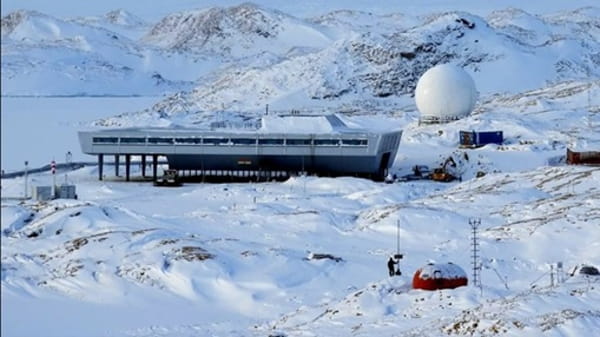
Representative Image. | Central European Initiative.
Abstract
The convergence of scientific knowledge and diplomatic strategy is increasingly defining the contours of international engagement in a world marked by deep geopolitical divisions and rapid technological advancement. This article delves into science diplomacy as a critical interface that shapes multilateral negotiations, strategic treaties, and the global governance of emerging technologies.
Through an expansive discussion, the episode traces the history, challenges, and institutional forms of science-led diplomacy, spotlighting key sectors such as nuclear energy, space exploration, agriculture, climate change, artificial intelligence, and polar science. Offering practical illustrations from international forums and bilateral arrangements, this conversation unpacks how science both transcends and is shaped by national interest, commercial ambition, and global responsibility[1].
[Abridged and substantiated from a podcast episode titled The One Way Street of Science Diplomacy - a conversation between Dr. Sulagna Chattopadhyay, Editor-in-Chief of Geography and You and Ambassador Pankaj Saran, Convenor NatStrat and former Deputy National Security Adviser of India.]
Introduction
In the twenty-first century, the boundaries between science, diplomacy and statecraft are becoming increasingly porous. No longer confined to laboratories or academic institutions, science today is central to how countries define national power, negotiate global treaties, and respond to planetary crises. From pandemics to climate change, from artificial intelligence to rare earth mining, the ability to understand and apply scientific knowledge has become indispensable to global governance. Yet, this intersection—often termed “science diplomacy”—remains an under-examined and under-institutionalised domain, particularly in the Global South[2].
This article offers a critical exploration of science diplomacy as both an emerging imperative and a long-standing practice. The article reflects on how scientific knowledge can both enable international cooperation and become a site of strategic competition. It revisits historical precedents where science has been harnessed for peace building—such as during the Cold War—and also highlights contemporary challenges, such as the politicisation of AI regulation, the monopolisation of critical minerals, and the deepening fragmentation of global research networks. Through examples from nuclear negotiations, space treaties, vaccine development, climate frameworks, and polar cooperation, the discussion illustrates how science has always been central to diplomacy, but is now increasingly subject to geopolitical disruption. As national interests harden and global institutions falter, science diplomacy must be reimagined not only as a policy tool but also as a safeguard for humanity’s collective future.
Evolution of the Alliance between Science and Diplomacy
Scientific engagement with diplomacy is not new. Many professionals who initially worked in fields such as nuclear physics, agricultural research, and astrophysics eventually entered administrative and policy-making roles. These individuals moved from conducting experiments to managing research institutions, drafting policies, and representing their nations in international forums. Notably, some rose to represent their countries in international scientific bodies, thereby becoming unofficial ambassadors of science.
This trajectory reveals a one-way movement—science shaping diplomacy, rather than diplomacy shaping science, highlighting the prerequisite of deep domain expertise for credible international engagement[3].
Examples span across sectors including nuclear technology, agricultural innovation, food security, climate science, and astrophysics. These domains have produced prominent figures whose technical knowledge has directly informed international protocols and national strategies[4].
The Centrality of Scientific Knowledge in International Forums
The inclusion of scientific expertise in multilateral and bilateral discussions is not incidental, it is essential. In cases involving nuclear issues, scientific insights were indispensable in shaping the negotiation of international treaties. For example, in discussions on nuclear non-proliferation, the question was not merely about weapons, but about ensuring national scientific progress was not curtailed by discriminatory clauses. The Nuclear Non-Proliferation Treaty of 1970 drew an arbitrary line: nations possessing nuclear capabilities before a certain date were granted the status of nuclear weapon powers, while others were excluded. This decision embedded inequity into the global nuclear order, effectively freezing the technological hierarchy.
Space exploration raised similar concerns. Negotiations around limiting space debris or regulating satellite launches required policymakers to consult scientists on launch capabilities and the implications of operational constraints. Comparable challenges emerged in treaties governing deep-sea mining, the use of fissile material, and maritime biodiversity.
Currently, artificial intelligence has emerged as the most urgent domain demanding science diplomacy. The governance of AI is under active negotiation, with questions of ethics, safety, national interest, and dual-use potential occupying the global stage. The implications of AI, from economic productivity to societal disruption, require decisions that are both scientifically grounded and diplomatically negotiated.
Commercialisation of Science and Diplomacy
Scientific innovation increasingly intersects with national security and economic dominance. The possession of rare earth elements or advanced technologies, such as semiconductor fabrication, offers not just commercial advantage but strategic leverage[5]. This creates a competitive environment where states may withhold knowledge or technologies to maintain superiority, thereby transforming scientific advancement into an instrument of soft power.
The dual nature of science, as a public good and a commercial asset, poses a diplomatic dilemma. Scientific resources, whether vaccines or critical minerals, can be used to build dependencies and monopolies. While international institutions exist to mediate this tension, states often prioritise national advantage, especially in high-stakes sectors like biotechnology, energy and defence.
The vaccine production programme in one country during the pandemic exemplified how long-term investment in scientific infrastructure yielded global respect. The ability to produce high-quality, affordable vaccines at scale was not incidental; it resulted from years of consistent support to scientific institutions in fields such as immunology, weather forecasting, and agricultural sciences.
Can Science function as a Peacekeeping Tool?
There is clear evidence that science has served as a bridge between adversarial nations. A notable example is the Antarctic Treaty, born during the Cold War and still operational today. It mandated that polar research would be strictly for scientific and peaceful purposes. Even during the height of geopolitical tensions, countries from opposing blocs continued to collaborate in Antarctic research. In recent years, despite ongoing armed conflict in other parts of the world, scientific teams from rival nations were known to share ships and stations in Antarctica, continuing climate and geophysical research.
Conversely, the Arctic illustrates how science can be disrupted by politics. Although initially cooperative, increasing militarisation and competition over resources have compromised the scientific neutrality of the region. The shift from environmental concerns to strategic interests underscores how geopolitical tensions can erode scientific collaboration.

Maitri, India’s second permanent research station in Antarctica. | Twitter/Sputnik India.
The developments highlighted above complicate India’s efforts to strengthen the ASEAN bloc as New Delhi supports a strong and unified ASEAN. Growing dependencies of countries like Myanmar and Cambodia on China complicate regional dynamics and exacerbate divisions within ASEAN, limiting India’s ability to counter Beijing’s expanding influence in Southeast Asia, especially in areas such as maritime security and regional cooperation including issues in the South China Sea (SCS).
Formal institutional frameworks for science diplomacy
Institutional mechanisms exist within diplomatic missions and national science departments to promote international scientific cooperation. Science and technology attachés posted in embassies liaise with host country researchers, facilitating knowledge exchange and joint projects[6]. At the domestic level, departments dedicated to science and technology oversee international agreements across fields such as space research, climate studies, and health innovation. There are over a hundred formal agreements with various countries, covering diverse areas of scientific collaboration.
Academically, the field of science diplomacy is gaining recognition. Scholars and former diplomats have published on the subject, although mainstream international relations syllabi still underrepresented the significance of science in foreign policy.
Separation of Science from Geopolitical Tensions
In an ideal world, science should remain untouched by interstate rivalry. However, current realities reveal otherwise. Scientific cooperation, particularly in high-stakes domains like data sharing, space technologies, and rare earths, is increasingly influenced by political tensions. In one instance, climate cooperation between two regional powers deteriorated as their bilateral relationship declined, despite prior collaboration on emission reduction strategies.
Funding withdrawals, disrupted research programmes and restricted academic mobility are now common consequences of geopolitical strains[7]. Institutions like the Arctic Council have seen their operations halted due to such tensions. While international bodies such as the World Meteorological Organization and the World Health Organization continue to function, their operations are increasingly politicised, affecting the credibility of scientific agendas.
Bilateral agreements sometimes offer more stability, particularly in narrow scientific domains. However, they too are vulnerable to deterioration in broader diplomatic relations. For instance, data-sharing agreements related to hydrology were among the first casualties when tensions rose between neighbouring countries. The domain of pure science, such as mathematics or theoretical physics, may be somewhat insulated, but applied sciences tied to national security or resource extraction remain politically sensitive[8].
Multilateral science institutions provide broader platforms but are often constrained by conflicting national priorities. As international cooperation becomes more fragmented, the credibility and efficacy of these institutions depend on the willingness of member states to depoliticise their operations.
Future of Science Diplomacy in Global Governance
Specialised treaties such as those governing the Antarctic function through exclusivity, with a limited group of countries maintaining control. On the other hand, global frameworks like the annual climate negotiations operate under universal participation but struggle to reach consensus. Scientific input is often sidelined once negotiations shift from evidence to economics and political feasibility.
A critical example of this dynamic occurred during debates on global temperature targets. Scientific models clearly distinguished between the implications of one degree, 1.5 degrees, or two degrees of warming. However, diplomatic negotiations became consumed by questions of responsibility, capacity, and economic impact. Ultimately, scientific recommendations were diluted to accommodate political compromise[9].
Conclusion
The growing prominence of science in international decision-making underscores the need for structured, ethical, and strategic science diplomacy. From space to seabeds, and from climate modelling to artificial intelligence, scientific expertise is now integral to diplomatic negotiation. However, for science to fulfill this role effectively, it must be protected from political instrumentalisation and institutional marginalisation.
Science diplomacy should not be seen merely as a technical add-on to foreign policy. It is a critical infrastructure for navigating shared planetary futures. Preserving its autonomy and strengthening its global legitimacy is imperative if the world is to face its existential challenges collaboratively and equitably.
[©️2025, Geography and You, originally published https://geographyandyou.com/gnylive/the-one-way-street-of-science-diplomacy, (reproduced with permission)]
Endnotes: